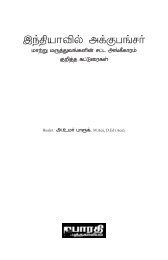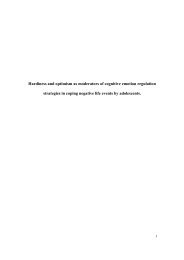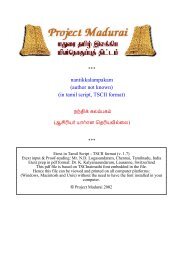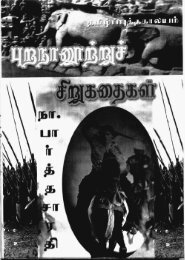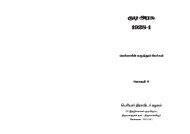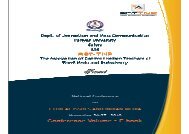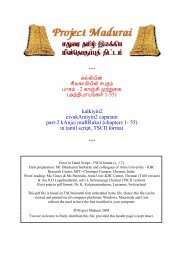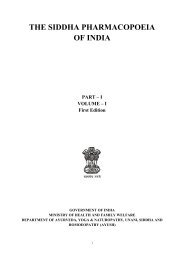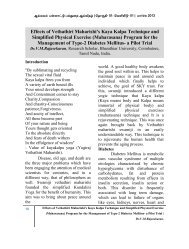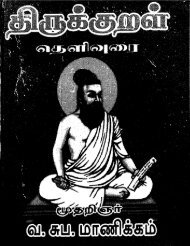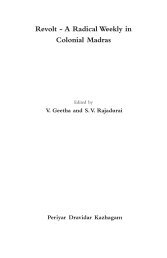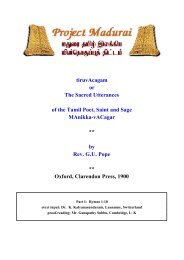THE FUNDAMENTAL RULES OF THE TAMIL NADU GOVERNMENT
THE FUNDAMENTAL RULES OF THE TAMIL NADU GOVERNMENT
THE FUNDAMENTAL RULES OF THE TAMIL NADU GOVERNMENT
- No tags were found...
You also want an ePaper? Increase the reach of your titles
YUMPU automatically turns print PDFs into web optimized ePapers that Google loves.
Reserve during the period of their training and when called up for active service will be regulated asfollows:—During Training.(i) Civil or service pay and allowances whichever is more favourable, if officers do not availthemselves of leave due in respect of their civil appointment during the period of training. Where thecivil pay and allowances are higher, the difference between the civil pay and allowances and theservice pay and allowances shall be a charge against the Government.(ii) Where, however, officers choose to avail themselves of leave at their credit in order to undergotraining, the civil leave salary and allowances may be given in addition to service pay and allowances.On Active Service.Civil or military pay and allowances whichever is more favourable, and where the civil pay andallowances are higher, the difference should be charge against the Government.Pay and Allowances.(i) The period of training and active list service (including the period of transit) shall count as dutyin the civil post for purposes of leave increments and also for pension if it does not count for militarypension under Army and Air Force Rules. The period of training and transit will not be treated asduty, if the Government servant avails himself of leave during the training or transit period. In suchcase, the Government servant shall be allowed to draw during training leave salary, in addition toservice pay, and during the transit period, only the civil leave salary.(ii) During the transit period, the Government servant shall be entitled to his civil rates of pay andallowances to be met from the budget head to which such expenditure is normally debitable, and asin (i) above, if the Government servant avails of leave during this period.(iii) No travelling allowance shall be payable by Government. Travelling allowance shall beadmissible as under from the Defence Service Estimates:—(a) When an officer is called up for training, he shall be entitled to the same travellor; allowanceby oil, road, river or sea on temporary duty scale as is admissible under regulations to regular officerstravelling on duty. These allowances are payable only for actual journeys performed and shall belimited to the maximum admissible, from the place at which the civil post is held or permanent place ofresidence in India to the place of training and return or back to any other station not involving extraexpenditure to the State.(b) When an officer is called up for active service and also on termination thereof, he will beentitled to the same travelling allowance as in (a) above.(c) During active service and also in the following circumstances, an officer shall be entitled toconveyance as is admissible to regular officers:—(1) On being compelled to resign his commission through circumstances beyond his control.(2) On dismissal or removal from the service or on being permitted to resign the commissionto avoid dismissal.(G.O. Ms. No. 706, Finance, dated 29th June 1962.)Lien.Temporary Government servants and persons on work charged establishment have no lien, in thetechnical sense, on the civil post held by them. However, on release from the military duty, all suchpersons should be absorbed in the posts in which they would have continued but for their“embodiment” subject to those post being available. if the post held by them is abolished while theyare on active service they will be treated to have ceased to be in civil employment.Benefits under the “Next Below Rules”.The period of service rendered by the reservists officers will be treated as service outside theordinary line for the purpose of proviso to Fundamental Rule 22 (b) (11). Accordingly they will beentitled to proforma promotion in their parent department under the next below rule. They will also getseniority in higher post to which they would otherwise be entitled had they not gone on active service.(Memo. No. 72748-FR/63-3, dated 8th August 1963.)314



